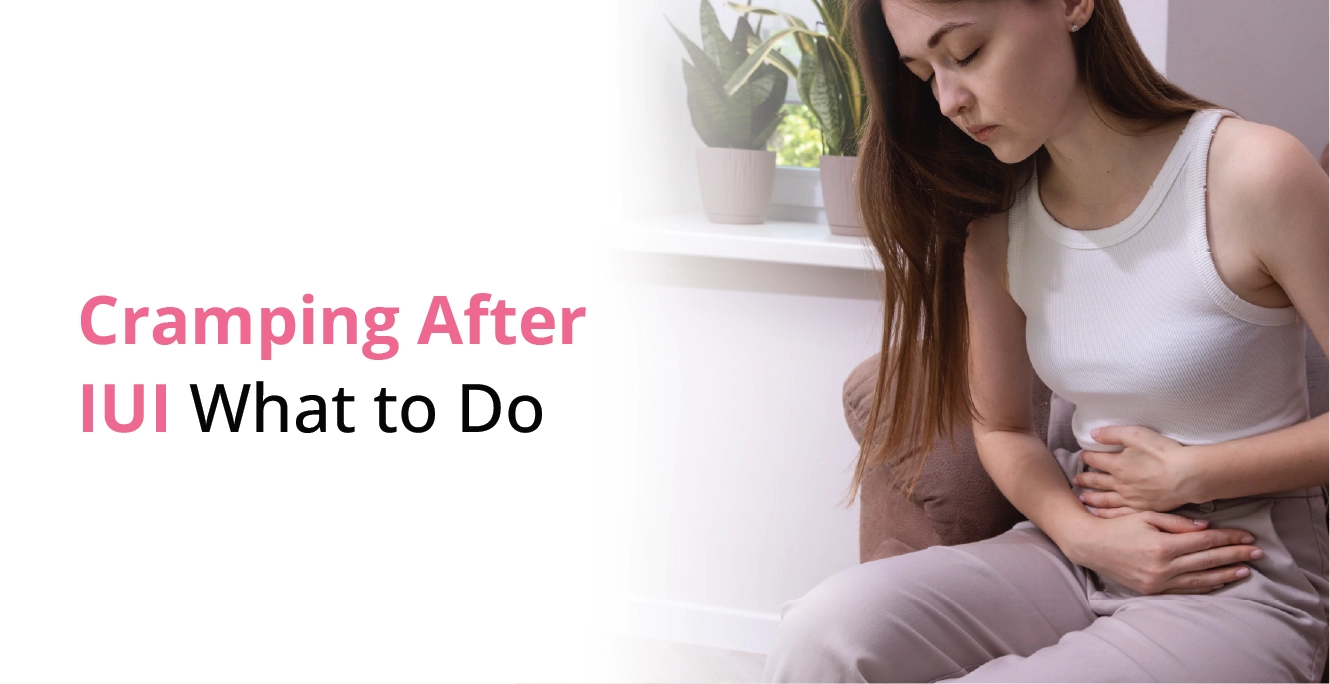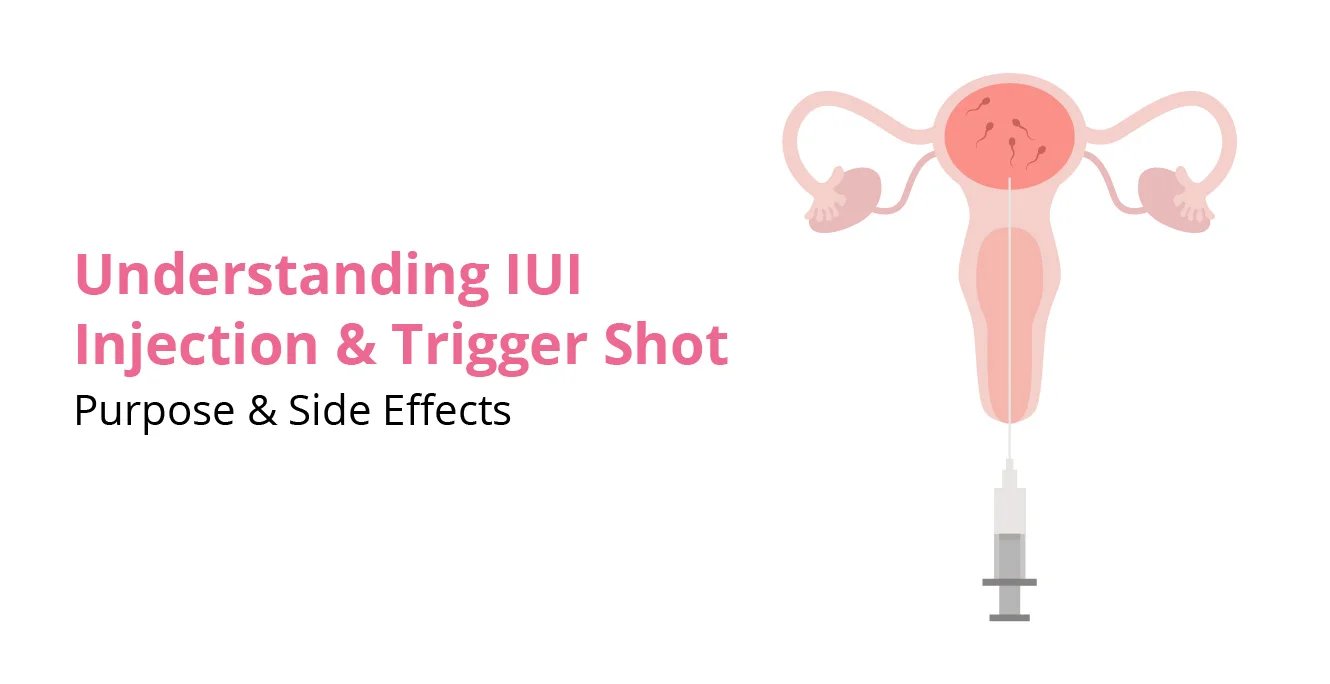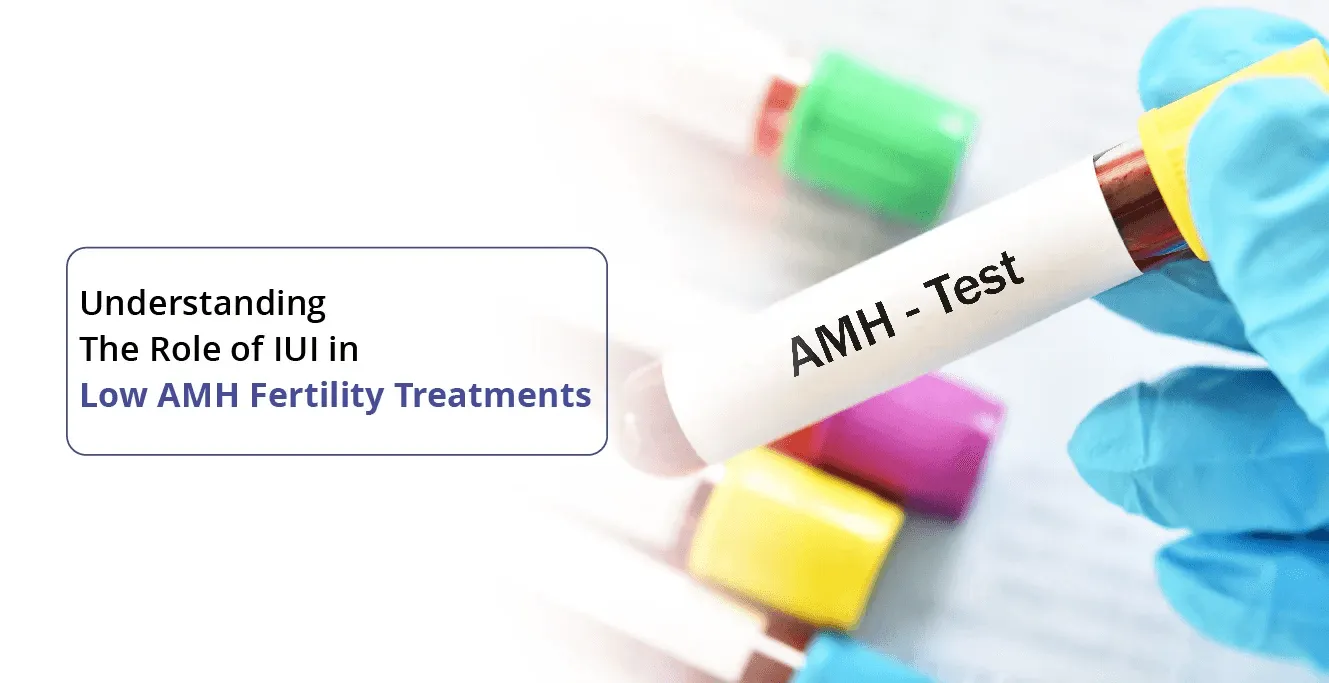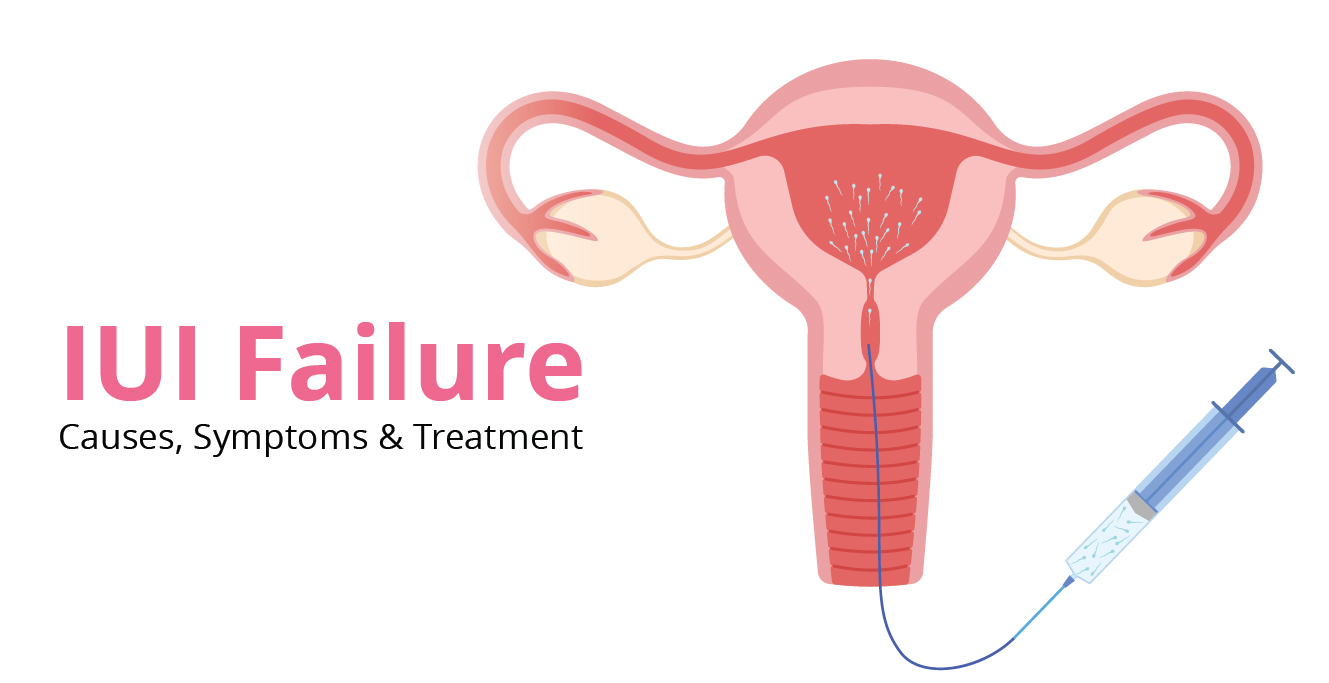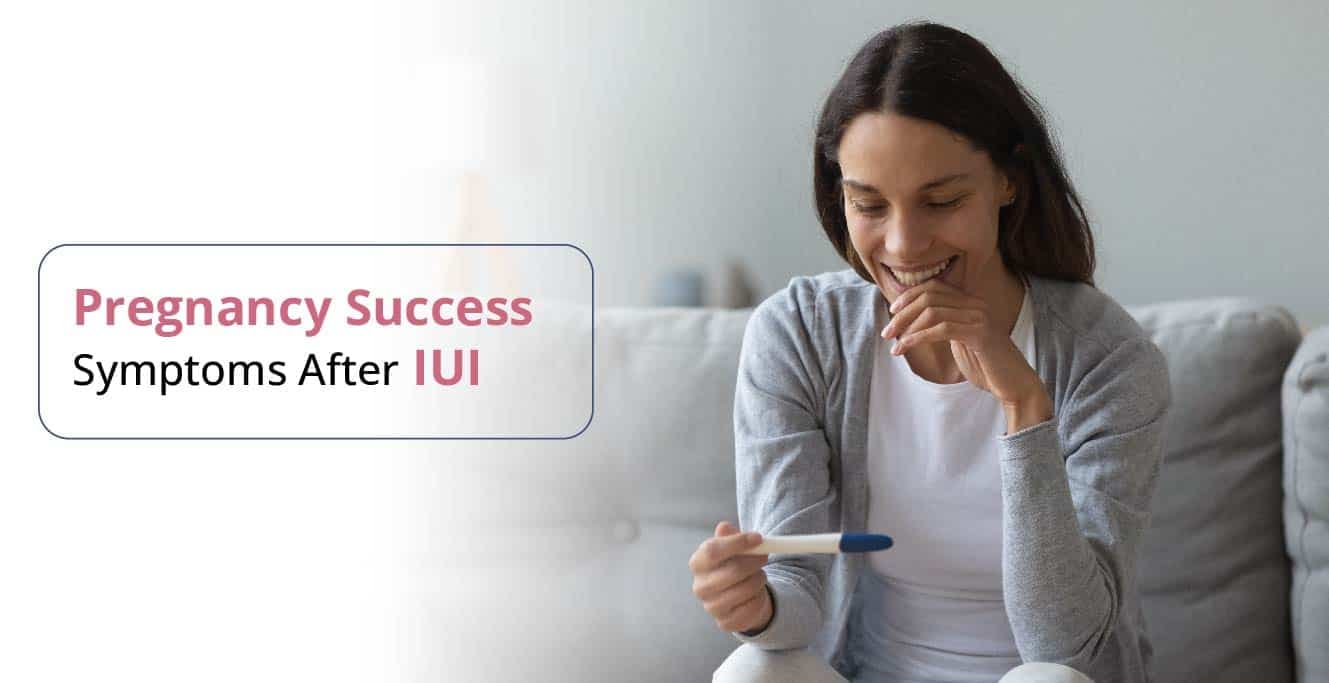
Pregnancy Success Symptoms After IUI

Table of Contents
- How Long Does the IUI Procedure Take?
- What are the Day-by-Day Symptoms after IUI ?
- What are the Most Common Pregnancy Symptoms After IUI?
- Negative Signs After IUI Procedure
- Key Factors Influencing IUI Success
- How to Boost Your Chances of Pregnancy After IUI?
- Precautions After IUI Procedure
- Conclusion
- Frequently Asked Questions (FAQs)
Three million couples actively seek reproductive treatments in India. Although they can be challenging, treatments utilising assisted reproductive technology (ART) are effective and give couples hope. Due to the multiplicity of these treatments and their outcomes, patients may get extremely perplexed. One of these forms of therapy is IUI. This article explains pregnancy success symptoms after an IUI pregnancy and some precautions that can be followed to achieve a successful outcome.
A fertility method is intrauterine insemination (IUI). It involves injecting sperm right into the uterus of a woman to increase the chance of fertilisation. Couples or individuals who are having trouble getting pregnant may benefit from IUI treatment for a number of reasons, such as low sperm counts, sperm motility abnormalities, or unexplained infertility.
It is an important stage in any fertility treatment if conception is the main goal. However, just like any course of action, IUI pregnancy can have both favourable and unfavourable impacts on your chances of becoming pregnant.
How Long Does the IUI Procedure Take?
The IUI procedure is quick, typically lasting only 5-10 minutes. However, there are several steps involved before and after the procedure.
- Before the IUI
You’ll undergo tests and scans to monitor your fertility and ovulation cycle. This may take a few weeks, and fertility medications may be prescribed to help you ovulate at the right time. Additionally, a sperm sample will be collected and prepared in the lab to ensure optimal sperm quality for IUI. - The Procedure
On the day of the IUI, the procedure is usually done within 5-10 minutes. A thin catheter is used to insert sperm directly into the uterus. It’s minimally invasive and typically doesn’t require anaesthesia, although mild cramping can occur. - After the IUI
Afterward, you’ll rest briefly at the clinic for about 15-20 minutes. Most women can return to normal activities soon after, though light spotting or cramping may occur.
You can take a pregnancy test about two weeks later to check for success.
What are the Day-by-Day Symptoms after IUI ?
After a successful IUI cycle, you might expect to experience changes in your body. Here is a day-by-day guide on what to expect after an IUI procedure:
Day 1-3 after IUI: Mild discomfort
- You may have some light spotting and mild cramping for a few days after your IUI. This is normal and caused by the procedure itself.
- You can continue your daily activities, but avoid anything that might make you feel uncomfortable.
Day 4-5 post-IUI: Fertilisation happens
- If all goes well, the sperm will fertilise the egg in your fallopian tube around this time. The embryo then starts its journey towards your uterus.
- You might still have some mild cramping, bloating, or spotting. Again, this is common and nothing to stress about.
Day 6-12 of the IUI cycle: Implantation
- During these days, the embryo should implant into the lining of your uterus. You may experience mild cramping or light spotting, which is called implantation bleeding. This is completely normal and may last a few hours to a couple of days.
- Early pregnancy signs like sore breasts, nausea, and tiredness may also start to show up now. However, these symptoms can also be attributed to hormonal changes.
Day 13-14: Time for a pregnancy test
- By Day 13 or 14, it’s time to take a pregnancy test after IUI. It’s important to wait until at least 14 days post-IUI to test, as this allows the pregnancy hormone (hCG) to rise to detectable levels. Testing too early may lead to a false negative result.
| Days after IUI | What’s happening |
| 1-3 | Mild cramping, light spotting, some discomfort |
| 4-5 | Fertilisation occurs; mild cramping and bloating |
| 6-12 | Implantation; mild cramps, spotting or implantation bleeding, breast tenderness |
| 13-14 | Time for a pregnancy test; hormone levels rising |
What are the Most Common Pregnancy Symptoms After IUI?
After IUI, several early pregnancy symptoms may appear, signalling the possibility of success. If your IUI is successful, you may notice the following signs:
- Missed period: A late period is one of the clearest symptoms of pregnancy after IUI. If your period is delayed by more than a few days, consider taking a pregnancy test.
- Breast changes: Hormonal shifts may cause tenderness, swelling, or heaviness in the breasts, along with increased nipple sensitivity and possible darkening of the areola.
- Fatigue: Feeling unusually tired or sleepy is common, as your body works hard to support the growing embryo.
- Nausea and vomiting: Morning sickness can start early and occur at any time of day. Small, frequent meals and avoiding strong smells may help.
- Implantation bleeding: Light spotting or bleeding around 6-10 days after IUI may occur when the embryo attaches to the uterine lining. It’s usually much lighter than a period.
Apart from the common signs mentioned above, you might also notice:
- Frequent urination
- Food cravings or aversions
- Mood swings
- Bloating or cramping
- Heightened sense of smell
Remember, every pregnancy is unique, and you may or may not experience all these symptoms.
Negative Signs After IUI Procedure
Keep in mind that sometimes the symptoms stated above may also be brought on by the hormonal medicines used during the IUI cycle to boost the success chances of conception. However, you should consult a fertility expert to find out whether your IUI pregnancy was effective or unsuccessful. It’s because a diagnostic pregnancy test is the only reliable technique to determine the results of your IUI cycle. Additionally, keep an eye out for any indicators of risk or complications. Which are:
- Bright red colour bleeding
- Severe cramping in the abdomen
- Neck, back, and leg pain
- High body temperature
- Dizziness
Key Factors Influencing IUI Success
Several factors can impact the success of Intrauterine Insemination. Understanding these key elements can help set realistic expectations and improve your chances of success:
- Age: Age is a significant factor in IUI success, particularly for women. Treatment is associated with better pregnancy outcomes in women under 35 years compared to women aged 40 and beyond, where chances of success significantly decrease.
- Timing: The timing of the IUI procedure is critical. The best chance of success occurs when the procedure is done 24-36 hours after ovulation is triggered with a hormone shot, allowing sperm to meet the egg at the optimal time.
- Thick Endometrium: A thick uterine lining is essential for successful implantation. If the lining is too thin, the embryo may struggle to implant, reducing the chances of a successful pregnancy.
- Lifestyle Choices: Poor lifestyle choices, such as smoking, excessive alcohol, high stress, poor diet, and lack of exercise, can negatively impact fertility by disrupting hormonal balance, delaying ovulation, and increasing the risk of IUI failure.
- Medical Conditions: Conditions like endometriosis or PCOS can make conception harder, thereby reducing the chances of successful pregnancy.
How to Boost Your Chances of Pregnancy After IUI?
Intrauterine insemination can be an effective fertility treatment, but there are steps you can take to increase your chances of success:
- Make Healthy Lifestyle Changes: Adopting healthy habits is crucial for boosting fertility. Eat a balanced diet rich in fruits, vegetables, lean proteins, and whole grains to nourish your reproductive system. Stay hydrated, as water improves cervical mucus, making it easier for sperm to reach the egg.
- Exercise Regularly: Regular, moderate exercise such as walking or yoga can support overall health and fertility. Avoid intense exercise, as it can interfere with hormone balance and conception.
- Manage Stress: High stress levels can negatively affect fertility. Incorporate stress-reducing activities like meditation, deep breathing, or journaling to keep stress at bay and help balance hormones, creating a better environment for conception.
- Work with Your Doctor for Precise Timing: Timing your IUI around ovulation is crucial for success. Your fertility specialist can help track ovulation through methods like ultrasounds or ovulation predictor kits, ensuring the procedure aligns with your most fertile window for the best chance of success.
- Consider Fertility Medications: Your doctor may recommend fertility drugs such as Clomid or Letrozole to stimulate your ovaries, increasing the number of eggs available for fertilization during the IUI procedure.
- Support Sperm Health: Successful IUI often involves both partners making healthy lifestyle changes. Encourage your partner to quit smoking, reduce alcohol intake, and avoid excessive heat exposure. A diet rich in antioxidants, vitamins, and minerals can improve sperm quality and motility, ultimately enhancing the chances of successful fertilization.
By following these steps and working closely with your healthcare provider, you can improve your chances of a successful pregnancy after IUI.
Precautions After IUI Procedure
The IUI procedure typically takes 20-25 minutes. Post insemination, it is necessary to take good care of yourself, and an expert may give you a few instructions you need to follow in order to boost the chances of a successful IUI procedure. Here are a few precautions you need to keep in mind after the IUI procedure:
- Avoid picking any heavy objects
- Do not consume caffeine or alcoholic drinks
- Quit smoking and any other tobacco products
- Avoid unhealthy sleep patterns
- Skip junk, oily and spicy food
- Avoid stress as much as you can
- Do not skip regular, minimal exercise
Conclusion
For couples struggling with unexplained infertility, intrauterine insemination, or IUI, is one of the non-invasive assisted reproductive technologies (ART) that has completely changed their lives. The WHO estimates that the prevalence of infertility in India ranges from 3.9% to 16.8%. The majority of couples find that the success rate of IUI is personal because the severity of the infertility disorder and body type varies from one person to another, including biological conditions and lifestyle decisions. However, the majority of couples can improve their odds by adopting healthy habits and using the aforementioned IUI success suggestions.
Frequently Asked Questions (FAQs)
Why is IUI recommended to couples?
Here are a few reasons for which IUI treatment is recommended:
- Unexplained infertility
- A female who is allergic to semen
- Low sperm count
- Sperm structural abnormalities
- Low sperm motility rate
What are the common fertility drugs used during IUI treatment?
IUI treatment is mostly combined with fertility drugs in order to boost the overall fertility health of the patient. Some of the common medications are:
- Letrozole
- hCG (human Chorionic Gonadotropin)
- Prenatal vitamins
- Clomid or Serophene
- FSH (follicle-stimulating hormone)
What leads to IUI failure?
Endometriosis, poor sperm morphology, poor sperm motility, low sperm count, and ovulation abnormalities are a few variables that can make IUI unsuccessful.
Are there any significant risks involved with the IUI cycle?
IUI treatment involves medication and fertility injections that are intended to increase ovarian stimulation. Potential risks from these reproductive medications include multiple pregnancies, OHSS, and other issues.
What happens if IUI is unsuccessful?
If the IUI cycle fails, your fertility specialist will examine you to determine the problem and seek to fix it using alternative treatment methods, such as IVF and ICSI.
Our Fertility Specialists
Related Blogs
To know more
Birla Fertility & IVF aims at transforming the future of fertility globally, through outstanding clinical outcomes, research, innovation and compassionate care.
Had an IVF Failure?
Talk to our fertility experts

 Our Centers
Our Centers







